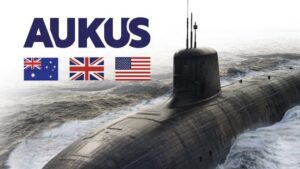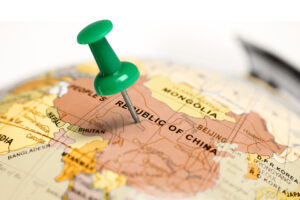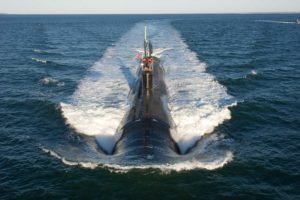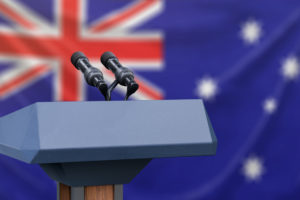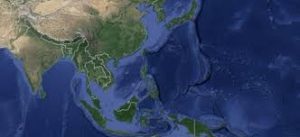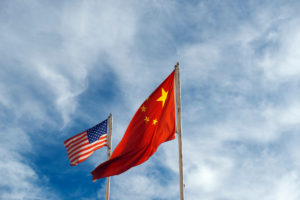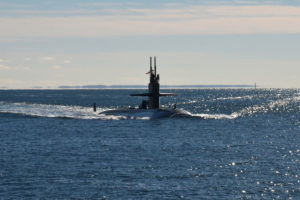The AUKUS deal was signed in September 2021 and subsequently evaluated by pundits and experts worldwide almost entirely based on one primary geo-strategic consideration: How does it affect the U.S.-China balance of power? The United States was willing to risk a major rupture in U.S.-France relations, and indeed EU-UK relations, to create a new alliance among three Anglo-Saxon powers determined to maintain technological dominance over China. In AUKUS’ wake, France has renewed calls for increased strategic autonomy for the EU—code for reduced defense dependence on the United States and increased ability to make independent decisions about dealing with China and Russia, even as NATO pulls more closely together and expands to include two new European members to help defend Ukraine.
Far less attention has been paid, however, to the ways in which AUKUS affects the security of people and planet from an emerging planetary politics perspective. How do everyday people think about and experience security and how do we manage threats that have implications for human and planetary survival? This perspective is not merely the province of academics, development experts, or global politics practitioners based in the global South. It is indeed well-captured by the EU’s new Indo-Pacific strategy, which was launched on the same day that AUKUS was announced and calls for a comprehensive investment in equally pressing needs for human security. The strategy includes such things as funding for the green energy transition, economic development, and increased digital connectivity.
Alliances are a strange business, particularly in a world of strong Great Power competition, which often creates unintended consequences. Viewed strictly through a military lens—as alliances so often are—they are a hedge against common threats. While not a formal treaty-based alliance, the United States, the UK, and Australia—three of the world’s most advanced tech powers—have increased their collective military strength by forging an important technology partnership. The leaders of all three countries believe that technology will determine the future of warfare and the margin of victory; they accordingly seek to lock in a technological edge that they do not believe France and the rest of the EU necessarily share. Moreover, much like with NATO, deeper defense industrial integration under AUKUS will also require technical expertise, creating a rich array of opportunities in terms of educational, economic, and cultural exchanges.
The partnership also knits together two of the world’s leaders in the mining industry—Australia and the United States—and one of the world’s largest trading hubs for precious metals and minerals—the UK. Given the importance of rare earth minerals (like lithium) for the future of both defense and civilian digital technologies and battery-powered and renewable energy, AUKUS should help Americans, Britons, and Australians feel much more secure.
Whether AUKUS will actually enhance global security—or even the security of its members—depends a great deal on China and, potentially, Russia’s reactions. The classic security dilemma spirals ever upward, with each side taking steps that it perceives as defensive, aimed only at countering a threat that the other side is posing. It is thus possible, and even likely, that AUKUS will set the United States and its allies on an accelerated collision course with China rather than check China’s geo-strategic ambitions. If so, then the world is less secure.
The potential benefits of an enhanced partnership will also test a global order that is already operating under extreme strain. On the one hand, we’ve already seen how the partnership has raised tensions between key NATO allies–the U.S., UK, and France at a time when Brussels has sought to distinguish itself from Washington and London in the geopolitical sphere. On the other hand, the AUKUS deal was sealed at a time when tensions over Ukraine and Taiwan seemed to only underscore the ways in which cooperation between partners in the West continues to draw strong reactions from Russia and China. All this points to at minimum a major realignment of the primary players in a rules bound system where the UN has been the primary arbiter.
Somewhat unusually, however, AUKUS could trigger not counter-alliances so much as side-alliances among countries that wish to stay out of the fray. Southeast Asian and continental European nations in particular are well placed to strengthen their existing associations in ways that will make them more independent from the United States. The result may not be at all what the U.S. government wants but may nevertheless be an important step toward enhanced global security.
Two other dimensions of AUKUS also deserve careful analysis from a planetary politics perspective: the impact of the deal on the proliferation of nuclear weapons and on the prospects for global governance of emerging technologies. Both issues extend far beyond U.S.-China geopolitics. Both also offer opportunities for the United States and its allies to practice far more inclusive global politics.
The Long, Winding Road Ahead for AUKUS Diplomacy
French President Emmanuel Macron’s recall of France’s ambassadors from Washington and Canberra following the announcement of the trilateral security pact in September 2021 created an immediate diplomatic kerfuffle, requiring the Biden Administration to engage in a month of intensive engagement with America’s oldest ally. A year later, the larger task ahead for the United States is to develop and execute a diplomatic strategy toward the EU and Southeast Asia and the Pacific island states that enables them to have more voice in and power over their own security and to play a stabilizing role in U.S.-China and U.S.-Russia relations.
In the Indo-Pacific region, AUKUS received a mixed response. Some regional stakeholders, like the Philippines, openly welcomed the deal. Others, like Singapore and Vietnam, were more circumspect, but their lack of criticism was notable. On the other hand, two of the region’s most populous nations—Indonesia and Malaysia—immediately raised open objections, citing fears about a regional arms race and an increased risk of U.S.-China clashes. A number of Pacific island nations, such as Kiribati, a former U.S. and UK nuclear testing site, have also expressed deep concerns about the risk of a nuclear incident. If war broke out between the United States and China, or a miscalculation occurred with the use of nuclear-powered submarines or other technologies implicated in the three-way compact, it could have a devastating effect on the roughly 2.5 billion people who call the Indo-Pacific home.
A regional arms race and the need to protect against a possible U.S.-China conflict also sharpen the classic “guns versus butter” dilemma for governments of countries that are still desperately poor. While Indonesia, for example, has seen a partial economic bounceback after the COVID pandemic’s onset, 10 percent of the country’s 275 million people still gets by on a little less than $2 a day and about half are surviving on $5.50, an amount the World Bank categorizes as the upper middle income poverty line. Indonesia constitutes South East Asia’s largest economy, but like others in the Pacific Rim it still struggles with high levels of income inequality. Yet Indonesia’s military now has a stronger argument for increasing defense spending, which may place additional pressure to cut poverty reduction and development spending elsewhere.
These trade-offs are also exacerbated by the need for massive spending in resilience infrastructure to protect against rising water levels and other environmental changes triggered by climate change. The Pacific island states face the actual disappearance of their territory, an existential threat that also augurs the migration of millions of people to other states in the region.
Former Indonesian Ambassador to the U.S. Dino Patti Djalal has called for ASEAN to play a stronger role in cooling the temperature of U.S.-China relations, to “articulate its interests more forcefully” and to lay out “a strategic design” to advance those interests that are accepted by the United States and China. The United States should expect to hear more of those voices and should consider supporting ASEAN as a stabilizing force in the region, rather than urging ASEAN nations to choose sides.
Similar dynamics are playing out in Europe. The surprise AUKUS announcement sent an ear-shattering signal to Beijing, Paris, and other European capitals that the new defense consensus in Washington centers on maintaining American technological prowess from tooth to tail—political costs be damned. President Macron responded with accusations of a fundamental betrayal of trust on the part of Australia and the United States, focusing less on the economic costs of cancellation of a contract than on the moral injury of disrespect and dishonesty among allies. He also reminded the world that due to its colonial past, France has 1.6 million citizens, 7,000 soldiers, and an exclusive economic zone in the Indo-Pacific.
The result has been a significant downgrading of French-Australian relations, from a long-term strategic partnership to “bilateral cooperation on a case-by-case basis.” EU leaders supported France, and were indignant in their own right, as the EU’s strategy deliberately de-emphasizes military competition in favor of deep investment and cooperation on a host of global problems. That strategy also clearly envisages the EU forging its own path by refusing to choose between the United States and China. AUKUS has sharpened this divide by raising the specter of a stronger Anglosphere acting independently of NATO allies in continental Europe. A similar tension is playing out with regard to the war in Ukraine, with France, Germany, and Italy taking a different line on when and how to negotiate with Russia than the UK and the United States.
The EU has a long row to hoe, however. The Russian invasion of Ukraine in February 2022 has strengthened NATO unity and given new impetus to European defense spending, with German Chancellor Olaf Scholz leading the way with his February 27 announcement that Germany will henceforth commit two percent of its GDP to defense; however, it will take years for those commitments to fully materialize. Scholz also made clear that although he seeks a strong NATO, he also envisages a more autonomous European defense capability. But greater defense autonomy will require increased investment in research and development and innovations that the EU will be ill-prepared to undertake as long as the war in Ukraine continues to place strains on the continent’s economy.
In terms of global security, a strong EU that can conduct its own diplomacy with Russia and China, while also standing with the United States in defense of democratic values, is likely to decrease the risk of a U.S.-China conflict and be a force for peace in Europe. At the same time, however, EU members face similar trade-offs to ASEAN members, even if they are, on average, far richer. The decision to spend more on defense means not only a decrease in domestic spending, but also a potential decrease in investment in renewable technologies, including hydrogen-based energy, where the EU is currently leading. It could also mean spending less on civilian power, such as the ability to take in and shelter refugees—including the 7 million Ukrainians now living inside the EU. The question is how to trade-off the tremendous peace-building investments that the EU has made in Europe and around the world—including about $4 billion in crisis response aid and $9 billion in loans to Ukraine—against the potential benefits of increased EU military capacity.
Assessing the Nuclear Factor
From a planetary politics perspective, the most obvious downside of AUKUS is its break with norms enshrined in the Treaty on the Non-Proliferation of Nuclear Weapons, also known as the NPT. Until now, Australia has remained firmly in the non-nuclear state category, so the transfer of attack submarines that are powered by weapons-grade highly enriched uranium, or HEU, sets a significant new precedent. It is quite possible that China, Russia, or Iran could now cite AUKUS to justify empowering their regional partners with comparable defense capabilities. Worse, the transfer of nuclear material and capabilities to a non-nuclear state could be viewed by rival states as a green light to armor up further by adding more submarines capable of firing nuclear or conventional weapons to their fleets. Worse still is the risk that the potential proliferation of nuclear capabilities could result in weapons-grade uranium falling into the wrong hands.
Indonesia, Malaysia, and other Pacific Rim states have raised all of the above scenarios as concerns. In a working paper submitted to the United Nations (UN) ahead of a scheduled conference on the NPT in July 2022, Indonesia also indicated that the risks to the environment in the event of an accident involving the transfer or handling of HEU are substantial.
At a moment when Vladimir Putin is openly threatening to use nuclear weapons to stop NATO countries from directly joining the war in Ukraine, the breaking of the nuclear taboo that has helped keep the world safe since 1945 is a real and immediate risk. It is thus incumbent on the AUKUS governments to focus on how to mitigate these concerns. Nuclear experts like Princeton University’s Frank von Hippel have outlined a number of possibilities.
One step the United States could take is to ensure that the submarines it transfers to Australia operate on low-enrichment uranium, or LEU, rather than HEU. This would raise higher barriers for the conversion of fissile materials into weapons-grade substances that could be placed in missile warheads, reducing proliferation risks. It would also put Australia on a more even footing with other states with nuclear submarines that have an abiding interest in maintaining the balance of power in the Indo-Pacific.
Six states have nuclear powered submarines that operate under various mission parameters in the region: the United States, China, Russia, UK, France and India. Of those, France and China already use LEU fueled propulsion systems while Russia and India use medium enrichment uranium and the U.S. and UK use weapons grade nuclear fuel. For these and other reasons, von Hippel and several nuclear non-proliferation experts urged the Biden Administration to take steps to assess submarine design elements that could help mitigate risks and address the fears of U.S. regional partners and rivals.
The implementation of AUKUS could pose an additional danger to the United States. The American people will suffer from the erosion of arms control norms, from the need to spend more and more on weapons necessary to keep up with our military rivals and the increased danger of nuclear annihilation. The world will also suffer from the reduced credibility of the U.S. government as a leader in strengthening and maintaining the NPT regime.
Alternatively, AUKUS could provide an impetus for new global efforts to strengthen that regime led by non-nuclear powers. Regional stakeholders are already returning to the non-proliferation bargaining table after years of paralysis in the face of rising U.S.-China tensions, and AUKUS was one of several issues raised at the 2022 NPT review conference. The UN, meanwhile, has set up a special taskforce to assess whether the nuclear submarine deal comports with the existing non-proliferation scheme. The United States could mitigate some of the global security dangers posed by AUKUS by addressing head-on any concerns raised about how tech transfers will reshape global non-proliferation agreements.
Getting AI and Quantum Computing Governance on Track
A critical and under-analyzed provision in the AUKUS agreement calls for greater intelligence cooperation between all three parties and more collaboration in the spheres of artificial intelligence (AI) and quantum computing. The implications of this provision are farther reaching and potentially more world-altering than the submarine deal. The escalating rivalry between the United States and China over how advanced technologies should be used and governed is already having real-world consequences for everything from the available supply of microchips to the security of personal data. Managed carefully, AUKUS could serve as a critical engine for building international norms for the governance of these sensitive and disruptive technologies, but little evidence suggests that any of the three parties have thought that far ahead.
As it stands today, the United States leads the global pack in quantum computing; China and Canada are only a few steps behind. Yet, Australia’s recent breakthrough development of the first atomic-level integrated circuit—an achievement reached by one of the country’s top female scientists in the field, no less—is a strong indicator of just how much all three parties to AUKUS stand to benefit from closer cooperation. The quantum computing field is still evolving; experts have variously predicted that it could take years for the technology to mature. Once the right architecture is in place for technical and information exchanges to take place, however, AUKUS will speed up that timeline.
AUKUS will have a similar impact on the field of AI, where machine learning–enabled technology could lead to the proliferation of conflicts and accelerate potential clashes between the United States and China. Many observers have called for efforts to place normative guardrails on the eventual uses of these sophisticated technologies. Before AUKUS, however, the debate about the governance of quantum computing and AI occurred largely in the abstract. The deal now makes more concrete for all concerned the real risks posed by quantum computing for the future of secure encrypted information flows as well the implications of AI on the future of defense technologies.
Given the long development arc for both fields, moments will unquestionably arise when the view in Washington on how to manage risks associated with these technologies will differ from that of London and Canberra. The U.S. government should anticipate these divergences and renew efforts, ideally in tandem with the EU, to pilot potential global norms. Voluntary self-restraint may seem self-defeating, but as with the use of nuclear weapons in Hiroshima and Nagasaki, U.S. officials should imagine the consequences of a deadly regional or global conflict sparked by hybrid intelligence.
Conclusion
From the perspective of global security for both people and planet, AUKUS holds as much peril as promise. History teaches that adversaries interpret one another’s actions as offensive moves, in both senses of the word, and respond accordingly. The United States would thus do well to encourage its regional allies in Asia and Europe to position themselves for maximum flexibility and to adopt a pragmatic posture leaning into de-escalation and even cooperation with China in some areas. Such foresight would also pay off with regard to the renewal of tensions between a perceived new Anglosphere and continental Europe.
At a time when a sizable bloc of nations, including many that the United States has courted, have been equivocal in their willingness to condemn and sanction Russia for its invasion of Ukraine, the U.S. government would benefit from viewing AUKUS through a global security lens. Thinking through the scenarios of catastrophe caused by great power conflict, nuclear conflict or nuclear terrorism, or conflict with weapons no longer controlled by human beings should create a renewed impetus for regional or global governance of such threats. Finally, a broader security lens brings critical trade-offs into focus, both between arms purchases and the provision of basic necessities for poor populations and between investment in traditional defense and the mitigation of and adaptation to the existential threat of climate change.
That is a lot to place at the feet of a trilateral agreement to provide nuclear-powered submarines. But in a volatile global political climate, with great powers jostling for supremacy, small catalysts can have grave results.
